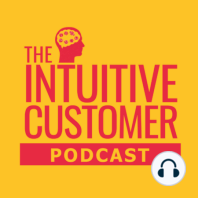20 min listen

Are You Managing This Key Driver of Poor Experience?
FromThe Intuitive Customer - Helping You Improve Your Customer Experience To Gain Growth
Are You Managing This Key Driver of Poor Experience?
FromThe Intuitive Customer - Helping You Improve Your Customer Experience To Gain Growth
ratings:
Length:
19 minutes
Released:
May 11, 2019
Format:
Podcast episode
Description
We don’t like uncertainty. It affects our lives in many ways, and especially as customers. Consider the fact that we buy insurance. We purchase peace of mind that we are covered if something unlikely (and terrible) happens. Likewise, we buy Powerball tickets in the improbable event that we will win. In other words, we are terrible at estimating the probability of unlikely events, for good or ill. This episode of The Intuitive Customer explores why that is at a psychological level and what you can do about it in your Customer Experience Design. The governing theory that presides over our collective inability to predict the likelihood of unlikely events is Prospect Theory. The brain-child of the Nobel-Prize Winning Economist Professor Daniel Kahneman and his research partner and collaborator Amos Tversky, Prospect Theory explains how we make decisions that involve risk and uncertainty. Two areas of concepts fall under Prospect Theory. The first is the Value Curve and the second is Probability Estimation. The Value Curve explains evaluating the subjective. Loss Aversion is part of the Value Curve and addresses how we hate losing more than we are happy to gain. Also, the Value Curve covers the ideas of Diminishing Marginal Returns, which is why we are sensitive to changes in the status quo, and Reference Points, which are how we usually have a standard that we use to compare two things. Probability Estimation is our ability to think the most unlikely events are imminent. We overestimate the likelihood of good and bad things happening. For example, we might be sure we are going to be eaten by a shark or convinced we picked the winning numbers in Powerball. Probability Estimation proves that when it comes to human behavior, we are pretty terrible at predicting the future as it pertains to the extraordinary. This particular part of Prospect Theory is inextricably linked to our behavior as customers—and probably more than we think. We all worry about weird things. There is a phrase I love that applies to this concept: I have had many crises in my life, but few of them actually happened. Managing uncertain moments in your Customer Experience design is essential. People need to know what is coming next and predict the future. It makes them feel comfortable and cared for, critical emotions for forming Customer Loyalty. Listen to the podcast in its entirety to learn more about managing customers’ uncertainty for your Customer Experience. The Intuitive Customer podcasts are designed to explain the psychological concepts behind customer behavior. If you would like to find out from one of our CX consultants how you can implement the concepts we discussed in your organization’s marketing to improve customer loyalty and retention, contact us at www.beyondphilosophy.com. To subscribe to The Intuitive Customer and never miss a podcast, please click here.
Released:
May 11, 2019
Format:
Podcast episode
Titles in the series (100)
Why Do Customers Complain?: ...and what you can do about it by The Intuitive Customer - Helping You Improve Your Customer Experience To Gain Growth